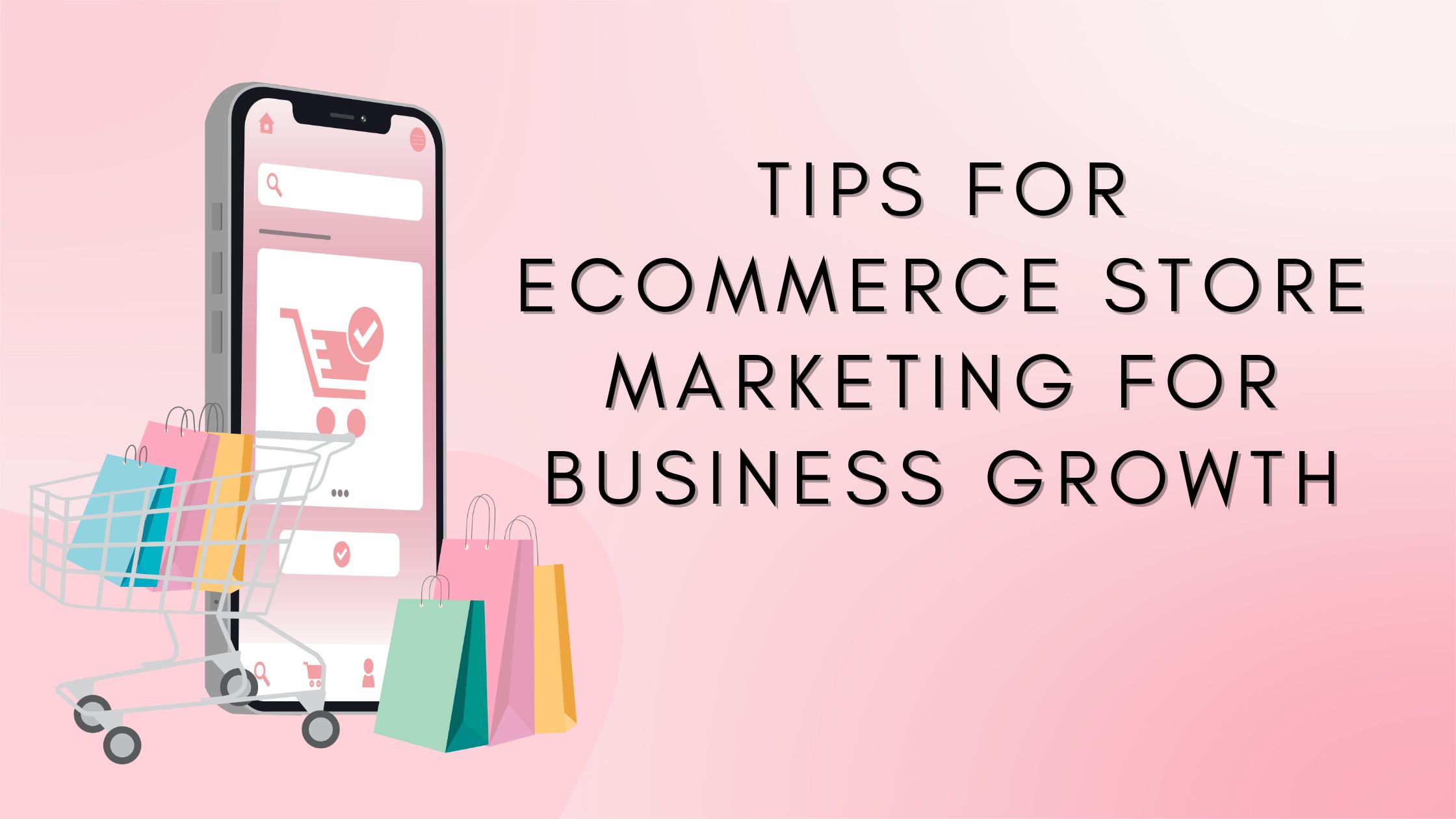Tips for Ecommerce Store Marketing for Business Growth
To grow your ecommerce business, you need smart marketing strategies.
Influencer partnerships and social media can boost your reach. Tailored content helps you engage and build trust with your audience. High-quality content like product videos and blog posts can improve SEO and bring more visitors to your store. Email marketing automation and user-generated content make customer experiences personal and drive conversions.
So, how do you mix these tactics into one plan for steady growth?
Let’s know in details.
What are the top ecommerce content marketing strategies?
When we look at the top ecommerce content marketing strategies, we find a bunch of effective approaches. These include influencer marketing, social media marketing, video marketing, email marketing, and content marketing.
Each one of these strategies has its own perks and can really boost customer engagement and sales.
Influencer Marketing
Influencer marketing is a super effective way for ecommerce stores to boost brand visibility and drive sales.
By teaming up with influencers who have built trust and gathered a dedicated following, ecommerce brands can reach new audiences and build trust faster.
Influencers can create genuine content that clicks with their followers, leading to higher engagement rates and more conversions.
It’s important for ecommerce businesses to pick influencers whose values match their brand and whose audience aligns with their target market.
This ensures that the partnership feels natural and resonates well.
Clear campaign goals and tracking key performance indicators (KPIs) like reach, engagement, and sales conversions help make sure that the influencer marketing efforts pay off and contribute to business growth.
Social Media Marketing
Social media marketing is key for ecommerce stores to get their name out there, connect with customers, and boost sales.
To make a splash, focus on creating content tailored for each platform that clicks with your audience. Use top-notch visuals and great storytelling to grab attention.
Keeping a regular posting schedule and adding fun stuff like polls and live Q&A sessions help build a community and keep engagement high.
User-generated content and teaming up with micro-influencers can make your brand feel more genuine and extend your reach.
Check your analytics to see what’s working and tweak your strategies on the go.
Paid social ads, along with your regular posts, help target specific groups and increase your brand’s visibility.
Mixing these tactics can build a strong online presence and drive steady business growth.
Video Marketing
Video marketing is a key strategy for ecommerce stores looking to catch their audience’s eye and boost sales.
High-quality product videos show off features, benefits, and how to use items way better than static images or text. Tutorials, unboxing videos, and customer testimonials build trust and give social proof.
Using platforms like YouTube, Instagram, and TikTok helps reach more people.
Live streams are great for real-time engagement, letting customers ask questions and get instant answers.
Adding videos to product pages also helps with SEO, which means more organic traffic.
To make the most of videos, keep them mobile-friendly and concise. Include compelling calls-to-action. (1)
And don’t forget to use analytics to track performance. This will help refine strategies and improve future content.
Email Marketing
Email marketing is still one of the best ways for ecommerce stores to connect with customers and boost sales. Making emails personal, automating campaigns, and splitting up the audience can make your efforts much more effective. By writing catchy subject lines and adding clear calls-to-action, businesses can build stronger relationships with customers and increase conversion rates.
|
Strategy |
Benefit |
Emotional Impact |
|
Personalization |
Higher engagement |
Feels valued and special |
|
Automation |
Time-saving efficiency |
Stress-free experience |
|
Audience Segmentation |
Targeted messaging |
Relevance and empathy |
Keep an eye on email performance metrics and keep tweaking your content to ensure ongoing growth and customer loyalty. Email marketing doesn’t just drive quick sales. It also helps build long-term relationships, creating loyal customers and supporting business growth.
Content Marketing
To get more people to visit your site and stay interested, ecommerce businesses need smart content marketing strategies that click with their audience.
Writing high-quality blog posts about customer problems and offering useful tips can really boost your search rankings.
Making fun videos, like product demos or how-tos, helps build trust and shows off what your products can do. Infographics are also great because they turn tricky info into easy-to-share visuals for social media.
Using SEO tricks, like the right keywords and good meta descriptions, makes sure people can find your stuff.
Keeping a regular posting schedule on social media and in email newsletters keeps your audience in the loop and engaged. This way, you keep growing your business steadily.
User Generated Content
One of the best ways to boost your ecommerce game is by using user-generated content. It makes your brand look more credible and helps create a sense of community. Ask your customers to share their experiences, reviews, and photos. This builds trust and shows authenticity. Plus, it makes shopping more fun for future buyers.
Put this user-generated content on your product pages, social media, and marketing campaigns. It can really increase engagement and sales. And don’t forget to share real customer stories and testimonials. They make your brand feel more human and relatable.
To keep the content flowing, try giving customers incentives like contests, loyalty programs, or exclusive discounts. This way, you’ll always have fresh and engaging content that your audience loves.
Necessary Ecommerce Store Marketing Tools
To market an ecommerce store successfully, using the right tools is super important.
You need email marketing platforms, SEO resources, Google Search Console, HubSpot, and Salesforce CRM. These tools help drive traffic, manage customer relationships, and make your marketing efforts more effective.
Email marketing platforms let you send newsletters and promotions directly to your customers’ inboxes.
SEO resources help you rank higher on search engines so more people find your store.
With Google Search Console, you can monitor your website’s performance and fix any issues that come up.
HubSpot is great for managing your marketing campaigns, and Salesforce CRM helps you keep track of your customers and their interactions with your store.
So, if you want to boost your ecommerce store’s success, these tools are your best friends.
They make everything easier and help you reach more customers.
Email Marketing Tools
Effective email marketing is super important for any ecommerce store’s success.
Picking the right tools can really boost your marketing game.
Platforms like Mailchimp, Klaviyo, and Omnisend offer great features for online shops.
They have automation, segmentation, and analytics.
Knowing what these tools can do helps you engage customers better and drive more sales.
Mailchimp
Mailchimp really shines when it comes to boosting email marketing for ecommerce stores.
It has a bunch of cool tools like automation, segmentation, and analytics.
These let businesses send personalized messages and keep customers hooked.
Plus, its easy-to-use interface and great integration options make life simpler for store owners.
With Mailchimp, you can streamline your marketing efforts and watch your customer retention and sales grow.
Kalviyo
Klaviyo is a must-have email marketing tool for ecommerce businesses. It offers cool features like powerful segmentation, automation, and detailed analytics. These tools help create personalized customer experiences that boost engagement and sales.
Omnisend
Omnisend is another powerful email marketing tool, perfect for ecommerce businesses, just like Klaviyo.
It has cool automation features, segmentation, and A/B testing to boost customer engagement.
With its user-friendly interface and strong analytics, businesses can easily create personalized campaigns.
Plus, it integrates smoothly with various ecommerce platforms.
This helps drive conversions and build customer loyalty.
SEO Tools
SEO tools play a big role in boosting your ecommerce store’s visibility and ranking on search engines.
Some of the best ones out there are Ahrefs, SEMRush, and Moz.
These tools help you with keyword research, site audits, and checking out the competition.
Using them can really boost your store’s online presence and drive more organic traffic.
Ahrefs
Ahrefs is a powerful SEO tool that gives ecommerce store owners a ton of useful info about keyword rankings, backlink profiles, and what their competitors are up to.
With all this data, users can boost their search engine optimization, find the best keywords, and keep an eye on how their rivals are doing.
The platform is easy to use and the analytics are detailed, making it a must-have for driving organic traffic and getting noticed online.
SEMRush
SEMRush is a must-have SEO tool for ecommerce store owners.
It gives you all the juicy details on keyword strategies, competitor analysis, and how well your site is doing.
With SEMRush, businesses can boost their search engine rankings by finding high-performing keywords and checking out what the competition is up to.
Plus, it offers detailed reports on site health, so store owners can tweak their online presence for better visibility and more traffic.
Moz
Moz has some pretty cool SEO tools that can really help online store owners boost their visibility and get more organic traffic. Using Moz’s features, you can keep an eye on keyword rankings, check out backlinks, and tweak on-page elements to improve your site.
These tools work together to create a strong SEO strategy. So, if you want to up your SEO game, Moz has got your back!
Google Search Console
Google Search Console is a must-have for ecommerce store owners who want their website to shine in search engine results.
This free tool from Google helps businesses keep an eye on, maintain, and fix their site’s presence in Google Search.
The performance reports are super handy, giving you the scoop on search queries, impressions, clicks, and your site’s average position.
It also points out issues with indexing, mobile usability, and security.
You can submit sitemaps and check for crawl errors to make sure search engines can access your site without any hiccups.
Using Google Search Console can boost your search rankings, bring in more organic traffic, and help your business grow.
HubSpot
HubSpot is a must-have tool for ecommerce store owners who want to streamline their marketing and improve customer relationships.
It offers a full set of tools like email marketing, social media management, and content creation, all aimed at boosting engagement and sales.
Plus, it has an integrated CRM that helps businesses keep track of customer interactions, segment their audience, and personalize communication.
This means your marketing can be more targeted and effective.
Its powerful analytics give you valuable insights into how your campaigns are doing, so you can make smart, data-driven decisions.
By automating those boring, repetitive tasks, HubSpot lets you focus on growth strategies and keeping customers happy.
With all these features, HubSpot is a real game-changer for any ecommerce store looking to up its marketing game.
Salesforce CRM
Salesforce CRM is a must-have tool for ecommerce store marketing. It offers powerful solutions to manage customer relationships and boost sales growth.
With features like lead management, sales forecasting, and automated workflows, businesses can streamline their marketing and enhance customer engagement.
Salesforce CRM provides valuable insights through advanced analytics and reporting, making it easier to make data-driven decisions.
Plus, it integrates well with various ecommerce platforms and third-party apps, ensuring information flows smoothly and optimizing operations.
Using Salesforce CRM, businesses can create personalized marketing strategies, improve customer satisfaction, and achieve sustainable growth in a competitive market.
It’s a critical asset in the ecommerce marketing toolkit.
Optimizely
Optimizely is a must-have for ecommerce store marketing. It’s great for A/B testing, personalization, and experimentation to boost user experience and drive more sales.
By letting businesses test different versions of web pages and features, Optimizely helps find out what clicks with customers the most. Its powerful personalization tools mean you can create experiences tailored to user behavior, demographics, and preferences.
The platform’s experimentation tools keep your marketing strategies in tip-top shape, making sure your decisions are backed by data. This means better performance all around.
Adding Optimizely to your ecommerce toolkit can lead to higher engagement rates, more sales, and a smoother customer journey. In a nutshell, Optimizely helps ecommerce businesses make smarter choices that fuel growth and keep them ahead of the competition.
AI Writing Tools
Using AI writing tools can really boost your content creation for ecommerce marketing. Tools like GPT-3 and Jasper analyze huge amounts of data to create text that speaks to your target audience. This makes the content production process much smoother.
Automating writing tasks helps keep your brand messaging consistent across different channels, whether it’s product descriptions or email campaigns.
AI writing tools also help with keyword optimization, which can improve your search engine rankings and bring in more organic traffic. Plus, they can do A/B testing by creating multiple content versions. This way, marketers can find out which one works best.
Ecommerce Store Marketing Automation
Marketing automation for an ecommerce store can really amp up efficiency by handling repetitive tasks and making customer interactions more personal.
These tools can take care of email marketing, social media posts, and sorting customers into different groups.
This frees up businesses to concentrate on bigger plans.
Using customer data, automation tools can whip up targeted campaigns that ensure customers get offers and content they care about.
This kind of personalization helps build stronger customer relationships and can boost conversion rates.
Plus, automating things like cart abandonment emails and follow-up messages keeps communication timely, making the customer experience smoother.
Marketing automation saves time and makes everything work better, helping ecommerce businesses grow and thrive.
What are the 5 C’s of eCommerce marketing?
The idea of the 5 C’s of eCommerce marketing gives you a solid plan for crafting killer marketing strategies.
These five key parts are Customer, Content, Context, Community, and Commerce.
Knowing your Customer is super important because it shapes all your marketing moves.
Content is a big deal too; it keeps your audience hooked and informed, making sure it’s useful and interesting.
Context means tweaking your message to match the platform and situation, boosting the user experience.
Building a Community helps grow brand loyalty and gets customers chatting.
Commerce is all about making the buying process smooth and enjoyable.
Mix these pieces together, and you’ve got a strong marketing game that can drive growth and keep customers happy.
What are the 4 P’s of e-commerce marketing?
Understanding the 4 P’s—Product, Price, Place, and Promotion—can help you nail your e-commerce marketing game.
Product means you focus on offering goods that people want and that stand out.
Price is about setting prices that are fair but still make you money.
Place is all about where you sell your stuff and how easy it is for customers to find it. Think user-friendly website and smooth delivery.
Promotion? That’s everything you do to get people to notice your product, like online ads, social media posts, and emails.
Put these four together, and you’ve got a solid plan to boost your e-commerce store’s visibility and profits.
How can I increase traffic to my Ecommerce store?
Want to get more people to visit your e-commerce store? You’ll need a mix of smart strategies to catch their attention and keep them coming back.
Social Media Marketing: Use Facebook, Instagram, and Pinterest to show off your products and chat with potential customers.
Content Marketing: Write blog posts, make videos, and design infographics that are interesting and useful. This will help you attract and keep a loyal audience.
Email Campaigns: Keep your audience in the loop with emails about new products, special deals, and other news.
Paid Advertising: Spend some money on targeted ads through Google Ads and social media. This helps you reach a bigger, but still relevant, crowd.
Mix these strategies together, and you’ll see more people visiting your store.
How do I optimize my Ecommerce store for SEO?
Optimizing your ecommerce store for SEO means making it easy for people to find you online.
Start by doing keyword research to see what your potential customers are searching for. Use these keywords naturally in your product descriptions, titles, meta tags, and URLs. Make sure your site is mobile-friendly and loads quickly. These factors impact your ranking on search engines.
Use high-quality images and add descriptive alt text to improve both accessibility and SEO. Write valuable and original content like blog posts to engage your visitors and attract backlinks. Keep your site updated with fresh content. Optimize internal links to make navigation easier and help search engines understand your site’s layout.
It’s like giving your store a makeover so it’s easy to find and shop in. Simple changes can make a big difference!
How can I use paid advertising to promote my Ecommerce store?
Paid advertising can really boost the visibility and sales of your ecommerce store. It targets specific audiences with tailored ads. Platforms like Google Ads, Facebook Ads, and Instagram Ads are great for reaching potential customers.
To get the most bang for your buck, plan strategically and keep optimizing.
Targeted campaigns are essential. Use detailed audience segmentation to make sure your ads reach the right people.
Ad creatives matter a lot. Invest in high-quality visuals and compelling copy that resonate with your audience.
A/B testing is your friend. Regularly test different ads to see which ones perform best. This way, you can make data-driven decisions.
Keep an eye on analytics. Monitoring key performance indicators (KPIs) helps assess your campaign’s effectiveness. Make necessary adjustments based on the data.
Using these strategies can drive substantial growth for your ecommerce business.
Wrapping Up
Growing your ecommerce business means using a mix of smart strategies.
Think about influencer and social media marketing, creating top-notch content, and using paid social ads wisely.
Tools like Klaviyo and Omnisend can help make your emails more personal and boost your conversion rates.
SEO optimization is key, too; it helps people find your site more easily.
Don’t forget email marketing automation and user-generated content.
These can build engagement and trust.
Put these tactics to work, and you’ll see more traffic and sales, leading to steady growth for your online store.
International Dropshipping: What You Need to Know
International Dropshipping: What You Need to KnowInternational dropshipping is a business model...
How to Fulfill Amazon Dropshipping? A Complete Guide
How to Fulfill Amazon Dropshipping? A Complete GuideAmazon dropshipping is a popular e-commerce...
Legal Considerations in Amazon Dropshipping: What You Need to Know?
Legal Considerations in Amazon Dropshipping: What You Need to Know?Legal considerations in Amazon...



